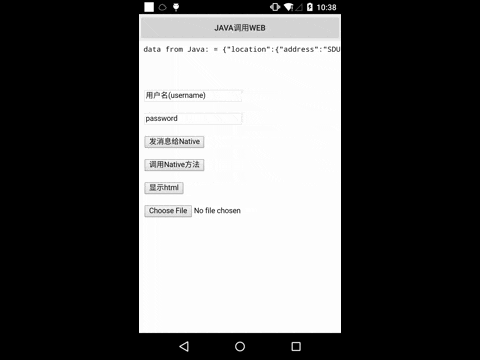#JsBridge
I fork this project and fix several bugs. All bugs come from when communicate with iframe.
There are two bug when work with iframe:
- the url is too large so that can result in package loss.
- the url changes too fast can result in package loss as well.
So,I change the core communicate way with alert,
and prompt js error to Java so I can handle it with showing error page or sth.
Also, this library adds safe WebView into the top level.
It throws Exception when meeting the incorrect Js injection used addJavaScriptFunction.
See more in Android JsBridge源码分析
inspired and modified from this and wechat jsBridge file, with some bugs fix and feature enhancement.
This project make a bridge between Java and JavaScript.
It provides safe and convenient way to call Java code from js and call js code from java.
add com.github.lzyzsd.jsbridge.BridgeWebView to your layout, it is inherited from WebView.
webView.registerHandler("submitFromWeb", new BridgeHandler() {
@Override
public void handler(String data, CallBackFunction function) {
Log.i(TAG, "handler = submitFromWeb, data from web = " + data);
function.onCallBack("submitFromWeb exe, response data from Java");
}
});js can call this Java handler method "submitFromWeb" through:
WebViewJavascriptBridge.callHandler(
'submitFromWeb'
, {'param': str1}
, function(responseData) {
document.getElementById("show").innerHTML = "send get responseData from java, data = " + responseData
}
);You can set a default handler in Java, so that js can send message to Java without assigned handlerName
webView.setDefaultHandler(new DefaultHandler()); window.WebViewJavascriptBridge.send(
data
, function(responseData) {
document.getElementById("show").innerHTML = "repsonseData from java, data = " + responseData
}
); WebViewJavascriptBridge.registerHandler("functionInJs", function(data, responseCallback) {
document.getElementById("show").innerHTML = ("data from Java: = " + data);
var responseData = "Javascript Says Right back aka!";
responseCallback(responseData);
});Java can call this js handler function "functionInJs" through:
webView.callHandler("functionInJs", new Gson().toJson(user), new CallBackFunction() {
@Override
public void onCallBack(String data) {
}
});You can also define a default handler use init method, so that Java can send message to js without assigned handlerName
for example:
bridge.init(function(message, responseCallback) {
console.log('JS got a message', message);
var data = {
'Javascript Responds': 'Wee!'
};
console.log('JS responding with', data);
responseCallback(data);
}); webView.send("hello");will print 'JS got a message hello' and 'JS responding with' in webview console.
This lib will inject a WebViewJavascriptBridge Object to window object. So in your js, before use WebViewJavascriptBridge, you must detect if WebViewJavascriptBridge exist. If WebViewJavascriptBridge does not exit, you can listen to WebViewJavascriptBridgeReady event, as the blow code shows:
if (window.WebViewJavascriptBridge) {
//do your work here
} else {
document.addEventListener(
'WebViewJavascriptBridgeReady'
, function() {
//do your work here
},
false
);
}This project is licensed under the terms of the MIT license.
